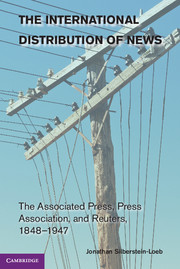 The International Distribution of News
The International Distribution of News Book contents
- Frontmatter
- Dedication
- Contents
- List of Tables
- Acknowledgments
- 1 Introduction
- 2 Conceiving Cooperation among American Newspapers, 1848–1892
- 3 Cooperation, Competition, and Regulation in the United States, 1893–1945
- 4 The “Rationalist Illusion,” the Post Office, and the Press, 1868–1913
- 5 Private Enterprise, Public Monopoly, and the Preservation of Cooperation in Britain, 1914–1941
- 6 Reluctant Imperialist? Reuters in the British Empire, 1851–1947
- 7 Cartel or Free Trade: Supplying the World’s News, 1856–1947
- 8 Conclusion
- Bibliography
- Index
- References
7 - Cartel or Free Trade: Supplying the World’s News, 1856–1947
Published online by Cambridge University Press: 05 July 2014
- Frontmatter
- Dedication
- Contents
- List of Tables
- Acknowledgments
- 1 Introduction
- 2 Conceiving Cooperation among American Newspapers, 1848–1892
- 3 Cooperation, Competition, and Regulation in the United States, 1893–1945
- 4 The “Rationalist Illusion,” the Post Office, and the Press, 1868–1913
- 5 Private Enterprise, Public Monopoly, and the Preservation of Cooperation in Britain, 1914–1941
- 6 Reluctant Imperialist? Reuters in the British Empire, 1851–1947
- 7 Cartel or Free Trade: Supplying the World’s News, 1856–1947
- 8 Conclusion
- Bibliography
- Index
- References
Summary
In 1942, Kent Cooper, general manager of the AP, wrote Barriers Down, a book in which he told of his “great crusade” against the “most powerful international monopoly of the nineteenth century”: the European news agencies. In the book, Cooper developed his thesis that through exclusive cooperative agreements, these agencies had placed restrictions on the “freedom of international news exchange,” contributed to the causes of World War II, and that there could be no “permanent peace” unless this freedom was guaranteed. Yet these agreements were at the center of the antitrust suit brought against the AP. In fact, Cooper’s book was partly intended to exculpate the AP from the suit. The eminent First-Amendment scholar Zechariah Chafee found it “inconceivable” that “men like Kent Cooper who put the barriers down in Europe think the barriers to the free flow of news should be kept high at home.” Managers at the UP, Reuters, and even the AP regarded the book’s narrative as misleading. In fact, in 1942, the same year the book was published, Cooper and Reuters concluded another cooperative contract. Agreements along these lines continued in various forms until at least 1967.
Cooper’s bias and hypocrisy are insufficient reasons to ignore his central thesis. Cooper’s idea that breaking down “the dams holding up the free exchange of news” would contribute to peace was a byproduct of, and integral to, the metaphor of the marketplace for ideas. Such logic was also a continuation, albeit in another form, of the rationalist illusion according to which news, if freely and competitively traded, is said to increase knowledge. In fact, cooperation was an effective means to subsidize the collection and supply of international news. However, as in the United States, the British Isles, and the British Empire, the world’s leading news agencies had to search continually for a balance between exclusivity and cooperation that fit with changing economic, political, and technological conditions.
- Type
- Chapter
- Information
- The International Distribution of NewsThe Associated Press, Press Association, and Reuters, 1848–1947, pp. 196 - 225Publisher: Cambridge University PressPrint publication year: 2014
